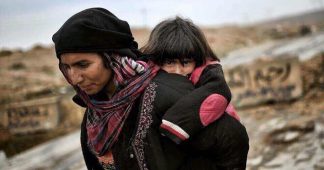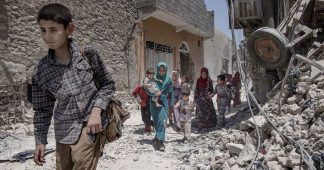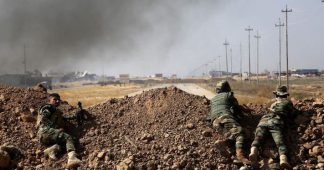By Mustafa Habib
www.niqash.org
When the battle for Mosul started in October last year, the Iraqi military prepared a media plan. Official statements could only come from the Ninawa Operations Command, the body that oversaw military operations in Mosul. And, the Iraqi military and government said, local media should check back with them to verify any information before publishing. They were worried about the same kinds of controversial rumours spreading, as had spread in Tikrit, Fallujah and other places where the extremist Islamic State had been present.
However, given that most Iraqis hardly trust their local media outlets anyway and that they mostly get their information from Facebook and other social media, controlling the flow of information has been an almost impossible task. After the announcement of victory over the Islamic State, or IS, group in Mosul, the trickle of information coming out of Mosul has become a flood.
“Whenever there are crises, we see more misinformation being spread,” says Iradah al-Jibouri, a spokesperson at the media department at the University of Baghdad. “That happens all over the world. But this seems to happen in Iraq almost more than anywhere else. It is possible for anyone to create a page on Facebook and post whatever they want without any fear of repercussions.”
“Iraqis are very passionate people and we use our passions instead of logic in these times. We search for the news that is in line with our own beliefs and political views. That is why individuals publish fake news, they seek to influence others through emotion,” al-Jibouri suggests.
There’s an urgent desire right now for news coming out of Mosul and many people only want to hear about IS members being arrested and military victories. So they seek this out and share it, al-Jibouri explains.
A few months ago the media department added a new course on open source verification, where students are trained in how to tell if news on social media is real or fake.
“There are electronic armies out there fighting a digital war,” al-Jibouri continued. “Those anonymous pages will publish a lot of misleading information during times of crisis, political dispute or during important battles.”
Given the ongoing focus on the northern city, which was under the control of the IS group since the middle of 2014, there have been many wild stories circulating both inside and outside Iraq.
The One about the Female Sniper from Russia
The Iraqi military has been conducting sweeps through the city of Mosul to find the last remaining pockets of IS resistance. Rumours began to circulate about a female sniper from Russia who had been found working with the IS group. Hundreds of Iraqi posts on Facebook spread the story, complete with a picture of a blonde woman, apparently in her 20s.
A few days later another rumour contradicted this one saying that the female sniper was in fact a Yazidi girl named Nidal, one of the hundreds kidnapped by the IS group in 2014.
To prove this, various posters on Facebook began publishing pictures of Nidal and her family, as well as identity documents apparently belonging to the Yazidi girl. The pictures had a striking resemblance to the Russian sniper.
However, once again this turned out to be false.
Last Sunday, a Yazidi politician in Baghdad, Fayan Dakheel Saeed, announced on twitter that the girl is neither Russian nor a Yazidi. She is a German girl, who was married to a Chechen fighter, a member of the IS group”.
Interestingly for many Iraqi journalists, none of the local media outlets who had published this story bothered to correct it or apologise to their audiences for publishing it.
The One about the Disco in Mosul
One of the stories that most excited young Iraqi people was the one that said a disco had opened in Mosul. It became a hot topic on Facebook and there was much debate, with some Iraqis arguing that it was better that a disco be built in Mosul than another mosque.
However, it soon became clear that the pictures that were being posted on Facebook were of a party in Arizona, in the US.
The Islamic State’s Doctor and the Mother Who Became a Suicide Bomber
Another of the bigger stories among Iraqis on social media was about a doctor who had allegedly joined the IS group. There were two pictures showing a man in a white coat who had been arrested by the Iraqi security forces. It has been impossible to verify this story.
Official sources would not confirm another troubling tale either. This was about a female IS member with a baby. She pretended to be a displaced person and was able to get close to a group of Iraqi soldiers in Mosul, before attempting to blow herself up while carrying her baby.
“We cannot be held responsible for the news media or for the information that is published on social media,” explains Ihsan al-Jabiri, a senior Iraqi army officer whose job is to draft daily reports and press releases about his unit’s position. And that includes news about victories against the IS group, al-Jabiri says. “For example, some media outlets announced victory in Mosul while there was still fighting going on. A lot of that was aimed at supporting and celebrating the armed forces. But in the end, it did more damage than good.”
Doxing Extremists on Facebook
One of the most dangerous examples of the current rash of misinformation are lists of alleged extremists. Pages run by anonymous Iraqis are publishing the names and pictures of individuals they say were members of the IS group. Most of the pages have thousands of followers and these followers re-post the lists, share them and comment on them, endangering the lives of all those who are on the list, whether they were IS members or not.
The other similar type of posts are those featuring what can basically be described as torture videos. These are clips filmed usually by members of the Iraqi military or militias showing how suspected members of the IS group are treated. Some of the videos are gruesome, featuring torture and even executions. Others show interrogations and beatings.
There are dozens of these videos and they are seen by thousands of Iraqis. Besides the obvious and unlawful abuse of the individuals in the videos, there are other dangers. For example, in one of the videos a blindfolded man is being interrogated by a group of Iraqi soldiers. He says that he is related to Iraqi MP Jamila al-Obeidi. Nobody knows whether this is true or not but now many ordinary Iraqis believe that al-Obeidi is a supporter of the IS group.
Iraqi media organisations publish this kind of information without verifying it because of a lack of professionalism, says Hassan Kamel, a professor of media studies at the University of Baghdad.
“It’s a complex problem,” Kamel told NIQASH. “Officials refuse to give journalists and the general public information, even if the topic is of importance to the general public. This means that social media sites can publish fake news and nobody knows who to believe. The problem is compounded by the fact that most media outlets are owned by political parties, therefore they care less for their professional responsibilities and more for whatever agenda they serve.”











